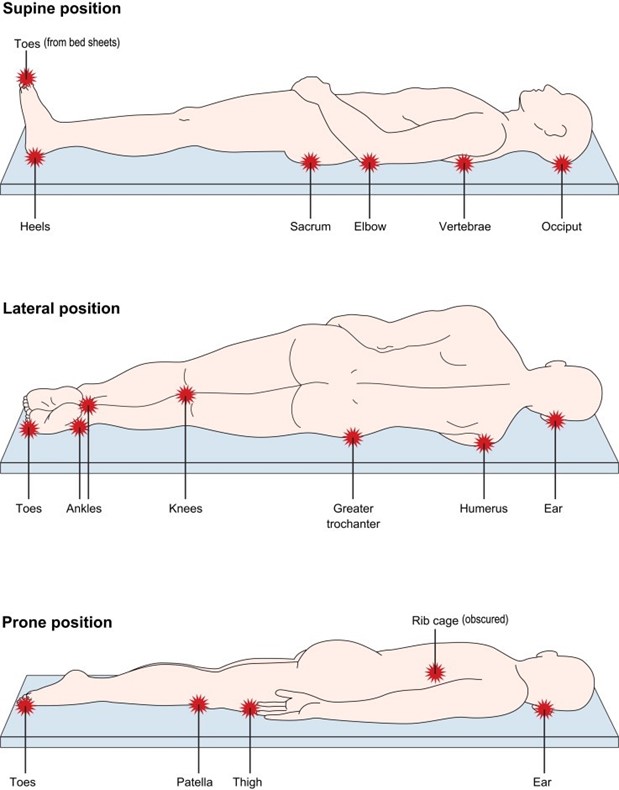A nurse is helping to place a client into the prone position. The nurse should use a small pillow to relieve pressure from which of the following areas of the client's body?
Occiput
Breasts
Heels
Coccyx
The Correct Answer is B
The occiput refers to the back of the head. Placing a small pillow or padding under the occiput can help relieve pressure and provide support to the client's head and neck when they are placed in the supine position.
Breasts: When in the prone position, breasts may be compressed or flattened. To relieve pressure, it may be necessary to use positioning techniques that distribute weight evenly and avoid direct pressure on the breasts, such as using cushions or foam pads to support the chest and torso.
Heels: The heels are prone to pressure ulcers when a client is lying in the supine position for extended periods. To relieve pressure, it is important to use proper heel offloading techniques, such as placing heel protectors or pillows under the lower legs to elevate the heels off the bed surface and prevent direct pressure.
Coccyx: The coccyx is the tailbone region at the base of the spine. When in the supine position, pressure on the coccyx can be relieved by using a cushion or padding under the pelvic area, specifically under the bony prominence of the coccyx, to reduce direct pressure and provide comfort.

Nursing Test Bank
Naxlex Comprehensive Predictor Exams
Related Questions
Correct Answer is D
Explanation
A. Lining waste containers with single bags is a proper infection control measure.
B. Using dampened cloths for dusting can help prevent the spread of airborne particles.
C. Using a puncture-resistant container for sharps is an appropriate action to prevent needlestick injuries.
D. Correct. Placing soiled linens on the floor can lead to contamination of the environment and potential transmission of infection.
Correct Answer is A
Explanation
A. Correct. Lightheadedness upon standing, also known as orthostatic hypotension, can be a common side effect of ACE inhibitors. Advising the client to sit down when experiencing lightheadedness will help prevent falls.
B. Incorrect. Discontinuing the medication without consulting a healthcare provider is not appropriate. Lightheadedness can be managed with strategies like changing positions slowly.
C. Incorrect. Restricting fluid intake is not necessary unless advised by a healthcare provider.
Adequate hydration is important, especially with the use of certain medications.
D. Incorrect. While potassium supplements might be prescribed in some cases with ACE inhibitors, the primary concern in this situation is addressing orthostatic hypotension.
Whether you are a student looking to ace your exams or a practicing nurse seeking to enhance your expertise , our nursing education contents will empower you with the confidence and competence to make a difference in the lives of patients and become a respected leader in the healthcare field.
Visit Naxlex, invest in your future and unlock endless possibilities with our unparalleled nursing education contents today
Report Wrong Answer on the Current Question
Do you disagree with the answer? If yes, what is your expected answer? Explain.
Kindly be descriptive with the issue you are facing.
